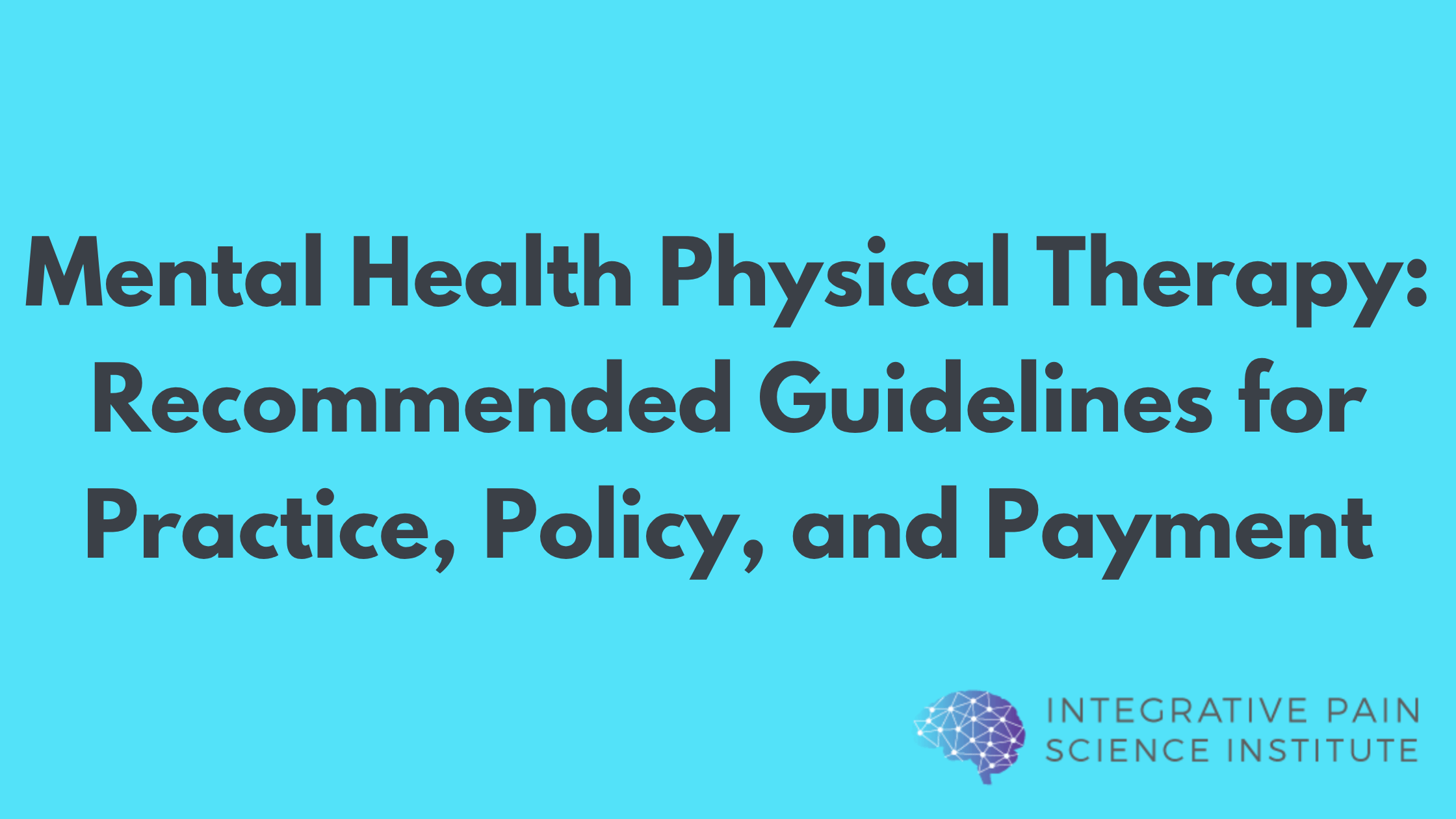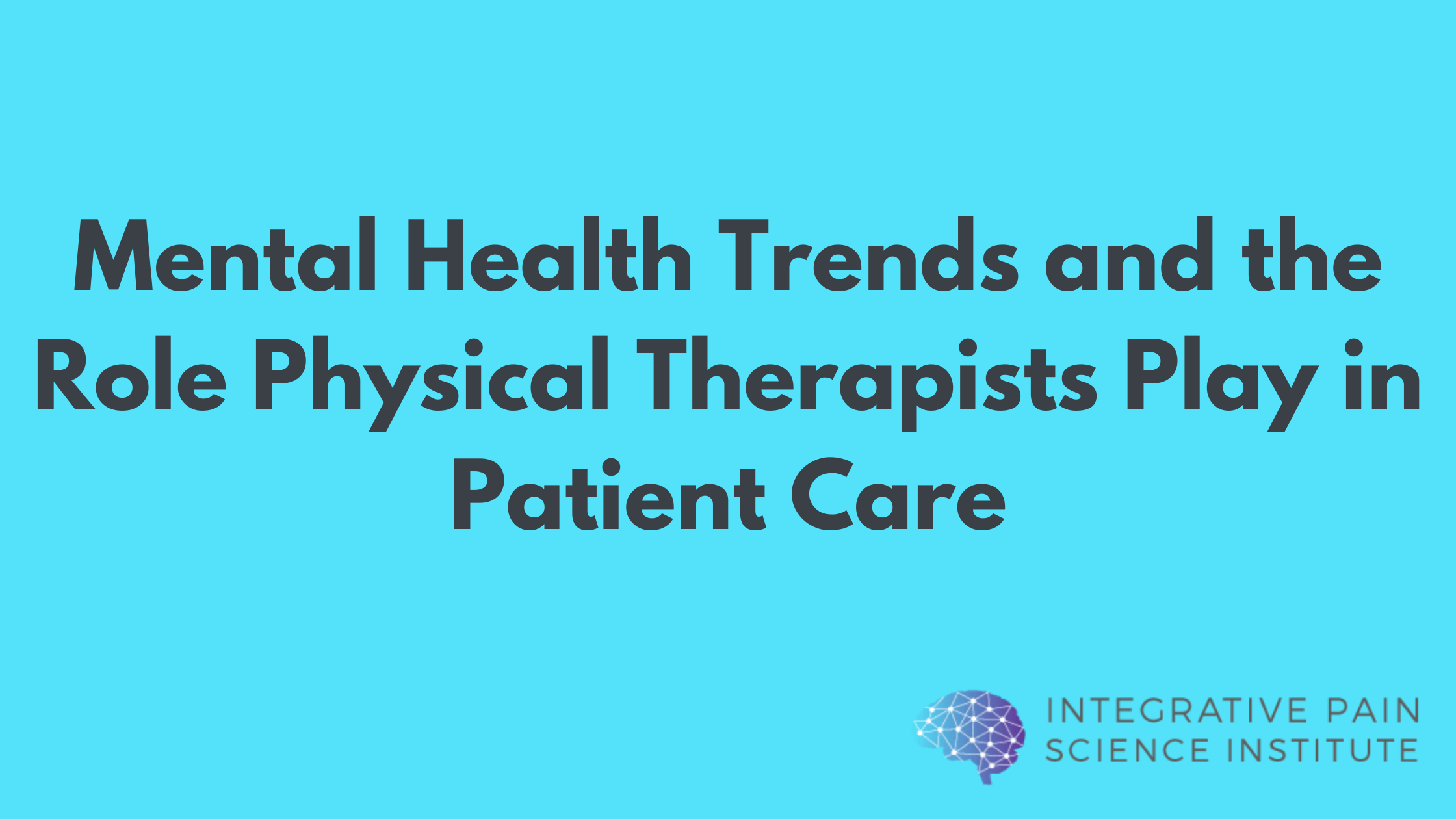Addressing a Physical Therapists Scope Of Practice Regarding Patient Mental Health Care
By Joe Tatta, PT, DPT
Physical therapists are interested in improving their patient’s mental health. Yet many are unsure of the physical therapist’s scope of practice in mental health care. This blog post provides guidance for the PT in mental health care. It also contains resources to support PTs on their journey to becoming excellent clinicians dedicated to helping people improve and restore mental health.
For a comprehensive overview of the physical therapist’s role in mental health, refer to our earlier blog post, The Physical Therapist’s Role in Behavioral and Mental Health.
How Mental Health Concerns Show Up In Physical Therapy
PTs play a role in mental and behavioral health. We aim to improve a person’s function, quality of life, well-being, and sense of empowerment. This comprehensive approach encompasses components of physical and mental health care. Mental health and physical health conditions frequently coexist. The comorbid impact of mental health conditions and chronic disease significantly exacerbates disability. PTs recognize this comorbidity in practice. More than 80% of PTs surveyed in the Journal of Physiotherapy report that they encounter patients with psychological distress weekly. For optimal results, it is recommended that PTs assess and manage psychological distress in patients and clients.
What Is The Physical Therapist’s Obligation for Ethical Patient Care
There is a professional Code of Ethics for physical therapy. This Code delineates our ethical obligations determined by the American Physical Therapy Association (APTA). The Code is divided into 8 Principles to empower, educate, and enable those with impairments, activity limitations, participation restrictions, and disabilities to facilitate greater independence, health, wellness, and enhanced quality of life. They include:
-
Principle #5: Physical therapists shall fulfill their legal and professional obligations.
-
Principe 6: Physical therapists shall enhance their expertise through the lifelong acquisition and refinement of knowledge, skills, abilities, and professional behaviors.
-
Principle #7: Physical therapists shall promote organizational behaviors and business practices that benefit patients clients and society.
-
Principle #8: Physical therapists shall participate in efforts to meet the health needs of people locally, nationally, or globally.
The principles speak to our obligation to address mental health. It extends to prevention, screening, assessment, and treatment. This is aligned with the U.S. Department of Health and Human Services Healthy People 2030 initiative to improve health and quality of life for people affected by mental health conditions.
What’s the Physical Therapist’s Scope Of Practice Regarding Client Mental Health?
The scope of practice for physical therapists is informed by three components:
1. Professional scope of practice
2. Jurisdictional scope of practice
3. Personal scope of practice.
I’ll go into the different components of our scope below so that you have a better understanding of each.
The Physical Therapist’s Professional Scope of Practice in Mental Health
Our professional scope of practice is grounded in the profession’s unique body of knowledge, supported by education, based on evidence, and linked to existing or emerging practice frameworks. It is ever-evolving based on innovation, research, and changes in societal health. The APTA House of Delegates (HOD) and the Commission on Accreditation in Physical Therapy Education (CAPTE) shape our professional scope.
The HOD is APTA’s policy-making body. In 2020, the HOD published policy P06-20-40-10 supporting the role of the PT in behavioral and mental health. The policy states: “It is within the professional scope of physical therapist practice to screen for and address behavioral and mental health conditions in patients, clients, and populations.”
CAPTE sets the standards and required elements for the accreditation of physical therapist education programs. Current CAPTE standards and required elements include education to support the PT’s role in mental health care.
Required element 7A, the Physical Therapist Professional Curriculum, includes:
-
Diagnosis
-
Differential diagnosis for physical therapists
-
Neuroscience
-
Pharmacology
-
Behavioral sciences necessary for entry-level practice
-
Psychosocial aspects of health and disability
-
Health and surgical conditions seen in physical therapy.
Required element 7D Screening and Examination includes:
-
Psychosocial aspects
-
Mental health aspects
Screening for and addressing mental health conditions is within our professional scope of practice. Now let’s take a look at our jurisdictional scope.
The Physical Therapist’s Jurisdictional Scope of Practice in Mental Health
The jurisdictional (i.e., legal) scope is established by a state’s practice act. This is where PTs can look for additional guidance. Some states specifically mention ‘mental conditions,’ ’emotional conditions,’ or ‘mental disability.’ Here are a few PT state practice acts that specifically mention mental health:
Alabama Practice Act: “The treatment of a human being by the use of exercise, massage, heat, cold, water, radiant energy, electricity, or sound for the purpose of correcting or alleviating any physical or mental condition or preventing the development of any physical or mental disability, or the performance of neuromuscular-skeletal tests and measurements to determine the existence and extent of body malfunction”
Connecticut Practice Act: “Physical therapy means the evaluation and treatment of any person by the employment of the effective properties of physical measures, the performance of tests and measurements as an aid to evaluation of function and the use of therapeutic exercises and rehabilitative procedures, with or without assistive devices, for the purpose of preventing, correcting or alleviating a physical or mental disability.”
California Practice Act: “Physical therapy means the art and science of physical or corrective rehabilitation or of physical or corrective treatment of any bodily or mental condition of any person by the use of the physical, chemical, and other properties of heat, light, water, electricity, sound, massage, and active, passive, and resistive exercise, and shall include physical therapy evaluation, treatment planning, instruction and consultative services.”
The Federation of State Boards of Physical Therapy (FSBPT) publishes a Model Practice Act (MPA) stating the “Practice of Physical Therapy means: examining, evaluating, and testing patients/clients with mechanical, physiological and developmental impairments, functional limitations, and disabilities or other health and movement-related conditions in order to determine a diagnosis, prognosis and plan of treatment intervention, and to assess the ongoing effects of intervention.”
Federal agencies may preempt state law. There is a recommended scope of practice for federally employed PTs. This allows federal PTs to practice at the top of their license, optimizing the use of their full skill sets. The Department of Defense has initiated jurisdictional changes so PTs can serve as primary care providers.
PTs should review their state practice act. But don’t forget to consider your personal scope of practice.
The Physical Therapist’s Personal Scope of Practice in Mental Health
I believe your personal scope of practice is the most important consideration regarding your ability to engage a patient in mental health care. Your personal scope consists of activities for which you are educated and trained and demonstrate an acceptable level of competence to deliver.
Your personal scope is shaped by education and specialized training. For example, a PT who has pursued a certification in mindfulness will have a broader and deeper understanding of how to integrate mental health components into their practice compared to one who has not.
A PT’s personal scope ensures they provide care within the bounds of what they are personally skilled and competent. PTs develop competency over time, depending on their areas of interest, and the populations they serve.
You decide on the competency of your personal scope of practice. This requires self-reflection. Ask yourself the following questions to assess your personal scope in the area of mental health care:
-
Do I have the skills and knowledge to carry out the activity safely?
-
Have I completed appropriate training to gain the skills and knowledge needed?
-
Do I have support in delivering new methods, skills, or techniques in practice?
It is important to understand all three components of our scope of practice. However, this may not answer all the questions you have as a mental health physical therapist. The guidelines often leave things out.
What the Guidelines Do NOT Say
Scope of practice guidelines leave out certain aspects or do not explicitly address certain areas of practice. Here are three topics that our scope may not clearly define or mention.
1. Specific recommendations on education, training, competencies
The guidelines do not provide recommendations on the education, training, or competencies of a PT in mental health. For example, practice guidelines DO NOT recommend:
-
The types of courses required (mindfulness, CBT, etc)
-
The number of training hours required
-
Specific competencies (i.e. tests, certifications)
This is why it is important to pursue quality continued education activities from physical therapists who have worked with mental health conditions and stay connected to a community of like-minded physical therapists.
2. Clinical judgment and decision-making
The guidelines provide a framework but do not dictate every clinical decision. Physical therapists must rely on their clinical judgment to tailor treatments to the specific needs of each patient. Guidelines also do not address situations where evidence is new, or limited, or where multiple treatment approaches could be considered. The latest advances are best found in journals, conferences, evidence-based health podcasts, and specialty practice settings.
3. How to navigate task-sharing or task-shifting with mental health providers
Physical therapists in mental health should be aware of the terms of task-sharing and task-shifting. Task-sharing refers to the process of delegating specific tasks traditionally performed by mental health professionals (i.e. psychologists) to less specialized healthcare workers, including PTs or allied health providers such as OTs. Task-shifting entails the shifting of tasks to make efficient use of resources. This allows all providers to work at the top of their scope of practice. Task-shifting and task-sharing are acceptable and feasible ways to close the gap in mental health.
Many PTs already work in a task-sharing or task-shifting capacity. Studies demonstrate that PTs routinely use mental health interventions to treat chronic health conditions. Given the directives from the White House to increase the diversity of the mental health workforce, PTs may be called upon to address mental health using low or moderate-intensity psychological interventions. Understanding task-sharing and task-shifting is an essential part of your scope of practice.
Making Sense of Your Scope of Practice
The best document I have found to understand the depth and breadth of a physical therapists scope of practice is the APTA Guide to Physical Therapy Practice 4.0 (Guide). The Guide provides helpful details that may be lacking or absent in other professional documents. Here are three areas that help inform mental health physical therapy.
1. Diagnosis
The Guide states that the scope of practice for physical therapists includes establishing a diagnosis to make appropriate management decisions for an individual. As part of the diagnostic process, a PT may identify and share findings with other professionals to ensure optimal services. If the diagnostic process reveals findings that are beyond the scope of the physical therapists knowledge, experience, or expertise, the PT should refer the individual to an appropriate practitioner. This speaks to our ability to diagnose, differentially diagnose, and our role in the diagnostic process.
2. Tests and Measures
The physical therapist uses tests and measures to characterize an individual’s level of mental function. The Guide mentions a specific category of tests called cognitive and mental functions. This includes both global mental functions, such as consciousness, orientation function, motivation, and impulse control, and specific mental functions, such as attention, memory, emotion, and perception. Examples of clinical indications mentioned by the Guide include depression and other psychological or psychiatric diagnoses as well as an illness or injury impacting mental functions. This speaks to our ability to screen for cognitive, behavioral, and emotional factors of health and disease.
3. Interventions
The Guide includes two categories of interventions significant for a PT in mental health. Educational and procedural interventions.
Educational interventions are used for self-management and health promotion and include:
-
Motivational interviewing (a mental health therapy)
-
Performance enhancement (think sports psychology applications)
-
Health, wellness, and fitness programs (e.g., mindfulness, meditation).
-
Cognitive and behavioral techniques to increase functioning and/or modulate pain.
-
Psychosocial influences on treatment (e.g., fear-avoidance beliefs, behavior change techniques).
-
Lifestyle intervention (e.g., stress management, sleep hygiene, nutritional recommendations, addressing environmental factors and exposures).
-
Addressing risk factors for pathology or health conditions, impairments in body functions and structures, activity limitations, and participation restrictions.
Procedural interventions describe the services within a physical therapists scope of practice, including:
-
Mental rehearsal
-
Imagery training
-
Relaxation training
-
Perceptual training
-
Sensory integration
-
Task-specific training
-
Observational modeling
-
Pain-modulating training
-
Environmental manipulation
-
Virtual reality adaptive training
-
Environmental stimulus training
-
Practice of closed and open skills to enhance performance



